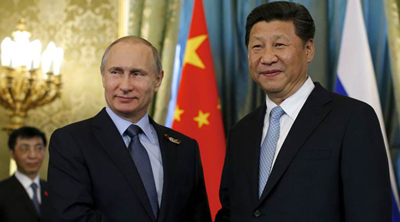| « She’s Back: Hillary Blames Everyone But Herself | US Threatens Pakistan » |
New US Sanctions on China and Russia
Stephen Lendman
Unilaterally imposed sanctions on any countries for any reasons are flagrantly illegal.
They’re hostile to international relations. They’re how hegemons operate - extrajudicially by their own rules alone.
On Tuesday, 16 Chinese and Russian entities and individuals were targeted, along with two Singapore-based companies for alleged involvement in trade with North Korea, sanctions expanded to include oil - what Security Council members excluded from their August 5 action.
Attempting to justify the unjustifiable, Treasury Secretary Mnuchin said “(i)t is unacceptable for individuals and companies in China, Russia, and elsewhere to enable North Korea to generate income used to develop weapons of mass destruction and destabilize the region.”
“We are taking actions consistent with UN sanctions to show that there are consequences for defying sanctions and providing support to North Korea, and to deter this activity in the future.”
Beijing blasted what it called America’s “long-arm jurisdiction.” A statement by its US embassy said “(w)e strongly urge the US to immediately correct its mistake, so as not to impact bilateral cooperation on relevant issues” - highly unlikely, further straining bilateral relations.
Moscow responded sharply. Deputy Foreign Minister Sergei Ryabkov said “Washington has stepped on the same rake again. This time, on the subject of North Korea.”
“The trend towards persistent destruction of bilateral relations, initiated by the Obama administration has been carried on.”
“It’s a fourth such escapade since the arrival of the new team in the White House…(W)e get down to pondering a response inevitable in this situation.”
“Washington should have learned in the past years that we do not accept the language of sanctions, since actions in that vein only impede the solution of real problems. But it looks like they have failed to grasp such obvious truths for the time being.”
Last month, Ryabkov said US sanctions once imposed won’t be lifted no matter what Russia does or doesn’t do - even if “we agree to anything and hoist a white flag.”
Russia and China foster good relations with all countries, favoring diplomacy to resolve differences.
Washington doesn’t negotiate. It demands - its policy consistent since Soviet Russia’s 1991 dissolution, the high point of bilateral relations during the Reagan/Gorbachev era long over.
Additional US sanctions were imposed at a time of heightened tensions - with large-scale joint US/South Korean military exercises underway, continuing through August 31 - what Pyongyang believes is preparation for war on its country.
Last week, DPRK state media denounced what it called a provocation “driv(ing) the situation on the Korean Peninsula into a catastrophe.”
Urging by China and Russia to halt the exercise in return for Pyongyang suspending its nuclear and ballistic missile testing was ignored in Washington and Seoul - on the phony pretext of needing to proceed for self-defense, despite North Korea posing no threat.
Following imposition of new sanctions, Rex Tillerson noted Pyongyang “restraint” since July 28, its most recent missile test - its last nuclear test in September 2016.
Russia, China and North Korea are permanent US enemies, targeted for regime change as long as they remain free from US control - risking eventual catastrophic nuclear war if dark forces in Washington aren’t curbed.
-###-
Stephen Lendman lives in Chicago. He can be reached at lendmanstephen@sbcglobal.net.
VISIT MY NEW WEB SITE: stephenlendman.org (Home - Stephen Lendman)
My newest book as editor and contributor is titled "Flashpoint in Ukraine: How the US Drive for Hegemony Risks WW III."



